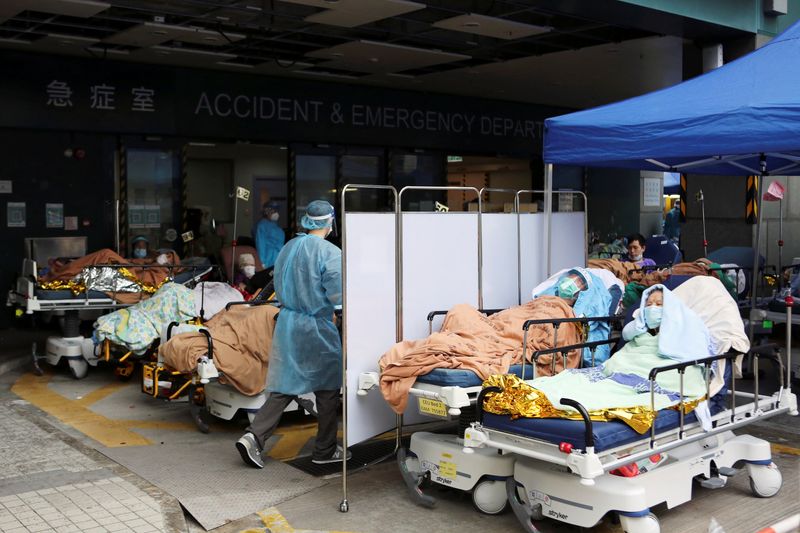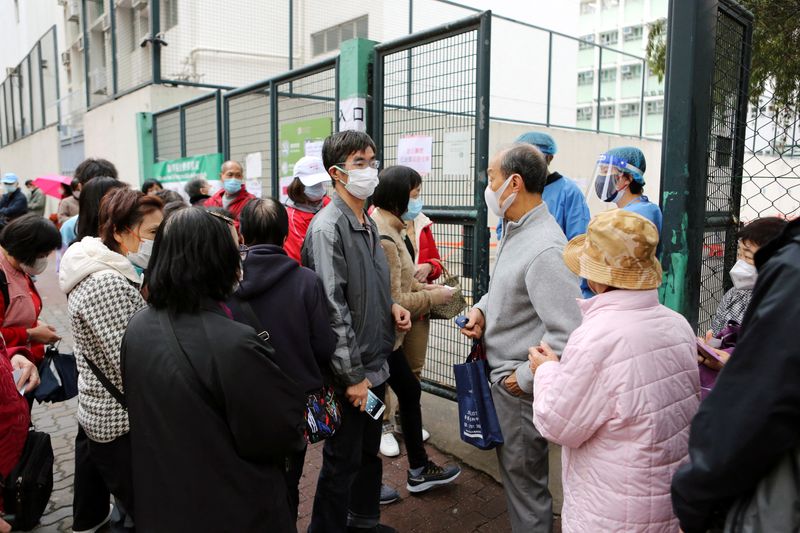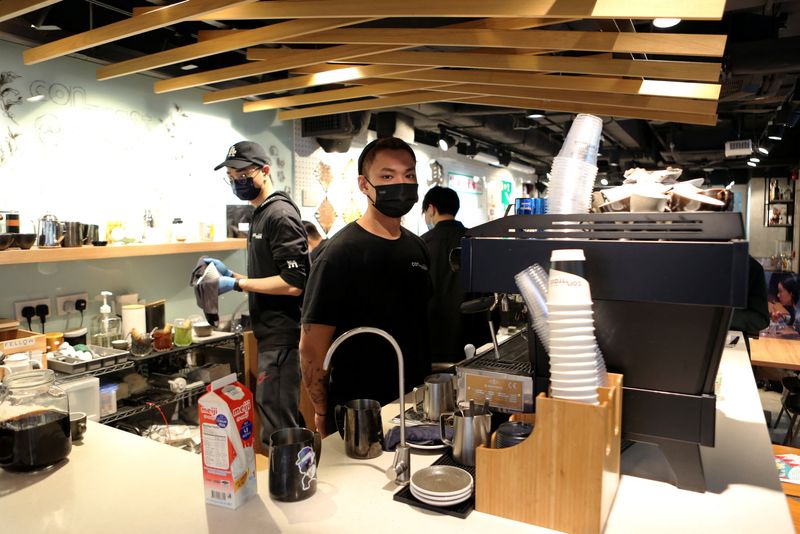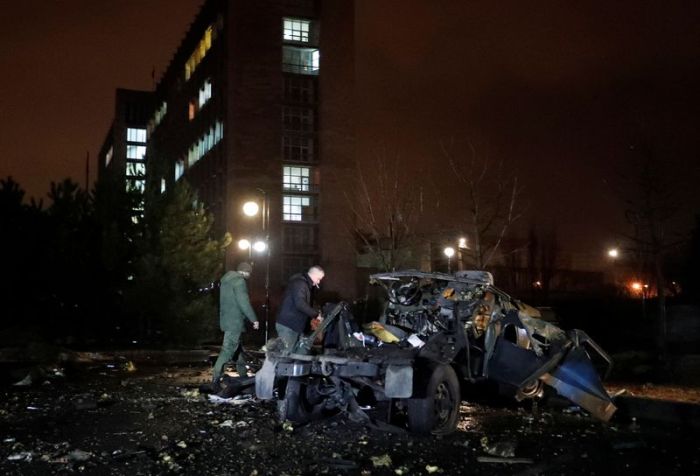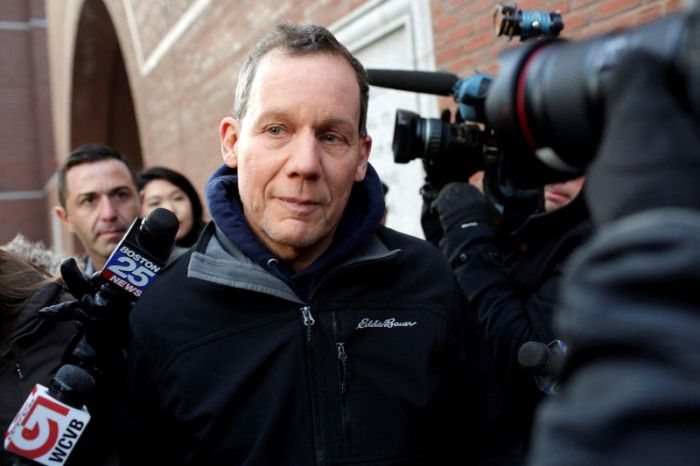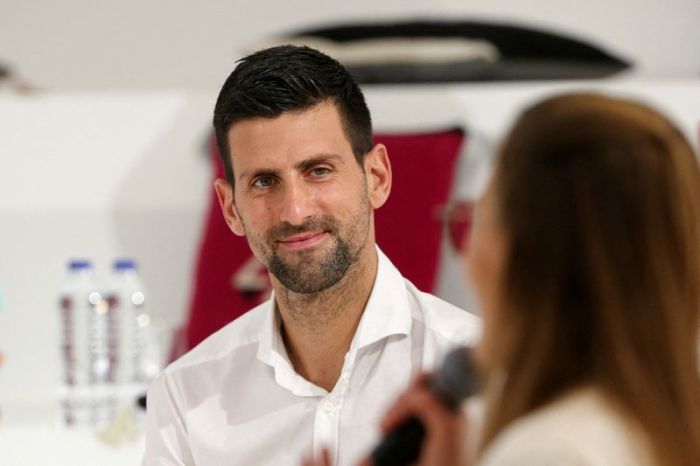HONG KONG (Reuters) – Lam Foon, 98, sits propped up and swaddled in soggy woollen blankets in a hospital bed just outside the entrance to Hong Kong’s Caritas Medical Centre, waiting for tests to confirm her preliminary positive result for COVID-19.
“I don’t feel so good,” she told Reuters through a surgical mask, next to a similarly wrapped patient wearing a mask and face shield.
Lam was one of dozens of patients lying in the parking lot of Caritas on Thursday, after there was no more room inside the hospital that serves 400,000 people in the working-class district of Cheung Sha Wan on the Kowloon peninsula. Temperatures dipped to 15 degrees Celsius (59 Fahrenheit) amid some rain.
Medical staff were unable to say how long Lam would have to wait. People who test preliminarily positive for COVID have to take further tests before treatment.
This and similar scenes across the global financial hub are signs of a public healthcare system under severe strain as COVID-19 cases surge, with more than 95% of all hospital beds full.
Once largely insulated from the coronavirus pandemic, Hong Kong is facing a citywide outbreak, with businesses buckling and some losing patience with the government’s “zero COVID” policies.
In the cluster of working-class districts in nearby Sham Shui Po, some residential blocks and public housing estates have been sealed off, crowds in malls and street markets have thinned, and once teeming diners known as dai pai dongs and stalls selling knick-knacks are quieter after dark.
Trevor Chung, 29, a medic at Caritas, blamed the government in part for inadequate planning, a shortage of beds and other medical equipment, and chronic manpower shortages.
“The government underestimated the situation,” said Chung, clad in a full-face visor and blue hazmat suit. “I expect things to get a lot worse … There are many elderly people in this district, and many aren’t vaccinated.”
Hong Kong authorities on Thursday apologised for the dire situation at hospitals serving the city of 7.4 million.
The city’s zero-COVID policy has meant even asymptomatic people and those with mild conditions have been sent to hospitals or quarantine centres, although the government is now adjusting its strategy as the healthcare system is overwhelmed.
LAM UNDER PRESSURE
The outbreak has piled further pressure on Hong Kong leader Carrie Lam, whose five-year term is due to end in June.
While Lam says surrendering to the virus “is not an option” and Chinese President Xi Jinping has said the “overriding mission” for Hong Kong is to rein in the virus, some are skeptical.
“You can see I’m wearing two masks. I need to protect myself because the government won’t protect me,” said Lo Kai-wai, a 59-year-old logistics worker queuing at a mobile testing centre that had already reached its daily quota of 3,000 people.
“I don’t want to see her (Lam) get a second term.”
Some business owners impacted by government-imposed restrictions also question the sustainability of current policies.
“The government needs to find a better balance to both control the virus, but also to allow people to better get on with their lives,” said Timothy Poon, 23, the manager of a cafe close to the hospital, whose business has dropped by up to 60% amid the outbreak.
“The zero-COVID policy is a mission impossible.”
Others, however, are more upbeat.
“If everyone is willing to get vaccinated, the situation will improve,” said Lung Mei-chu, 78, at a testing centre in another district.
(Additional reporting by Joyce Zhou; Editing by Anne Marie Roantree and Karishma Singh)

